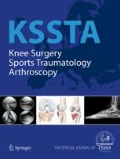Abstract
Purpose
Several different Krackow stitch configurations have been used for acute Achilles tendon rupture repair. Although several biomechanical studies compared different Krackow stitch configurations, to our knowledge, no previous studies compared the clinical outcome of these different suture methods. Therefore, in this study, we aimed to compare the clinical outcomes and complications of the two-stranded single and four-stranded double Krackow techniques.
Methods
Sixty-eight consecutive patients who underwent open repair by using the four-stranded double Krackow (33 patients, group A) or the two-stranded single Krackow (35 patients, group B) techniques between September 2011 and August 2014 were reviewed retrospectively. The isokinetic strength of plantar flexion and dorsiflexion of both ankles was assessed on a Cybex dynamometer 3 and 6 months after surgery. Clinical outcomes were evaluated 3, 6, and 12 months post-operatively.
Results
No significant differences were found between the groups regarding patient demographics or activity levels prior to treatment. Significant differences in the Achilles tendon Total Rupture Score, the American Orthopaedic Foot and Ankle Society Ankle–Hindfoot score, or the four-point Boyden scale were not found at any time during follow-up. Rerupture occurred only in one patient from group A. No significant differences were observed between the groups regarding the isokinetic plantar flexion and dorsiflexion strength at any time or any test speed.
Conclusion
Equally favourable clinical outcomes and isokinetic muscle strength and a low complication rate were achieved with the two-stranded single Krackow technique as compared with the four-stranded double Krackow technique for acute Achilles tendon rupture repair.
Level of evidence
III.



Similar content being viewed by others
References
Ames PR, Longo UG, Denaro V, Maffulli N (2008) Achilles tendon problems: not just an orthopaedic issue. Disabil Rehabil 30:1646–1650
Barrie KA, Wolfe SW, Shean C, Shenbagamurthi D, Slade JF 3rd, Panjabi MM (2000) A biomechanical comparison of multistrand flexor tendon repairs using an in situ testing model. J Hand Surg Am 25:499–506
Boyden EM, Kitaoka HB, Cahalan TD, An KN (1995) Late versus early repair of Achilles tendon rupture. Clinical and biomechanical evaluation. Clin Orthop Relat Res 317:150–158
Chiodo CP, Den Hartog B (2008) Surgical strategies: acute Achilles rupture-open repair. Foot Ankle Int 29:114–118
Gelberman RH, Woo SL, Lothringer K, Akeson WH, Amiel D (1982) Effects of early intermittent passive mobilization on healing canine flexor tendons. J Hand Surg Am 7:170–175
Hapa O, Erduran M, Havitcioglu H, Cecen B, Aksahin E, Guler S, Atalay K (2013) Strength of different Krackow stitch configurations using high-strength suture. J Foot Ankle Surg 52:448–450
Jielile J, Badalihan A, Qianman B, Satewalede T, Wuerliebieke J, Kelamu M, Jialihasi A (2016) Clinical outcome of exercise therapy and early post-operative rehabilitation for treatment of neglected Achilles tendon rupture: a randomized study. Knee Surg Sports Traumatol Arthrosc 24:2148–2155
Kitaoka HB, Alexander IJ, Adelaar RS, Nunley JA, Myerson MS, Sanders M (1994) Clinical rating systems for the ankle-hindfoot, midfoot, hallux, and lesser toes. Foot Ankle Int 15:349–353
Krackow KA, Thomas SC, Jones LC (1986) A new stitch for ligament-tendon fixation. Brief note. J Bone Joint Surg Am 68:764–766
Lantto I, Heikkinen J, Flinkkila T, Ohtonen P, Kangas J, Siira P, Leppilahti J (2015) Early functional treatment versus cast immobilization in tension after achilles rupture repair: results of a prospective randomized trial with 10 or more years of follow-up. Am J Sports Med 43:2302–2309
Lantto I, Heikkinen J, Flinkkila T, Ohtonen P, Siira P, Laine V, Leppilahti J (2016) A prospective randomized trial comparing surgical and nonsurgical treatments of acute achilles tendon ruptures. Am J Sports Med. doi:10.1177/0363546516651060
Lee SJ, Goldsmith S, Nicholas SJ, McHugh M, Kremenic I, Ben-Avi S (2008) Optimizing Achilles tendon repair: effect of epitendinous suture augmentation on the strength of achilles tendon repairs. Foot Ankle Int 29:427–432
Lee SJ, Sileo MJ, Kremenic IJ, Orishimo K, Ben-Avi S, Nicholas SJ, McHugh M (2009) Cyclic loading of 3 Achilles tendon repairs simulating early postoperative forces. Am J Sports Med 37:786–790
Leppilahti J, Puranen J, Orava S (1996) Incidence of Achilles tendon rupture. Acta Orthop Scand 67:277–279
McCoy BW, Haddad SL (2010) The strength of achilles tendon repair: a comparison of three suture techniques in human cadaver tendons. Foot Ankle Int 31:701–705
McKeon BP, Heming JF, Fulkerson J, Langeland R (2006) The Krackow stitch: a biomechanical evaluation of changing the number of loops versus the number of sutures. Arthroscopy 22:33–37
Nilsson-Helander K, Thomee R, Silbernagel KG, Thomee P, Faxen E, Eriksson BI, Karlsson J (2007) The Achilles tendon Total Rupture Score (ATRS): development and validation. Am J Sports Med 35:421–426
Shepard ME, Lindsey DP, Chou LB (2008) Biomechanical comparison of the simple running and cross-stitch epitenon sutures in achilles tendon repairs. Foot Ankle Int 29:513–517
Strickland JW (2000) Development of flexor tendon surgery: twenty-five years of progress. J Hand Surg Am 25:214–235
Watson TW, Jurist KA, Yang KH, Shen KL (1995) The strength of Achilles tendon repair: an in vitro study of the biomechanical behavior in human cadaver tendons. Foot Ankle Int 16:191–195
Zellers JA, Carmont MR, Silbernagel KG (2016) Return to play post-Achilles tendon rupture: a systematic review and meta-analysis of rate and measures of return to play. Br J Sports Med. doi:10.1136/bjsports-2016-096106
Author information
Authors and Affiliations
Corresponding author
Rights and permissions
About this article
Cite this article
Choi, G.W., Kim, H.J., Lee, T.H. et al. Clinical comparison of the two-stranded single and four-stranded double Krackow techniques for acute Achilles tendon ruptures. Knee Surg Sports Traumatol Arthrosc 25, 1878–1883 (2017). https://doi.org/10.1007/s00167-016-4265-0
Received:
Accepted:
Published:
Issue Date:
DOI: https://doi.org/10.1007/s00167-016-4265-0




